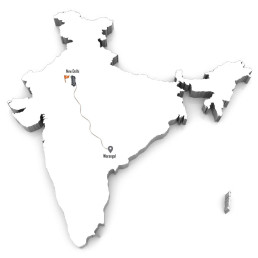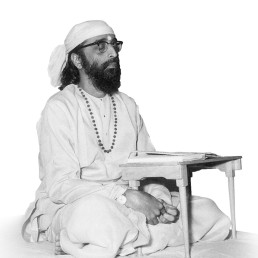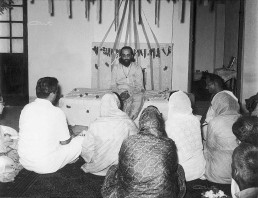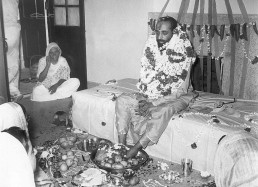
Jnana Yajna 89

Year & Dates:
July 12, 1961 to July 27, 1961

Yajna Topic:
Shrimad Bhagavad Gita- Chapter 16

Place:
New Delhi, India
Yet another early landing on July 11, 1961, at New Delhi’s Palam airport, and Pujya Gurudev, casual and unconcerned about any formal welcome, took a taxi to where His accommodation had been arranged.
Cleaning Leela: He entered 30, Ashoka Road, and cheerfully called out “Om Namo Narayanaya!” completely surprising Mrs. Sheila Puri, His longtime devotee, who was occupied with getting the newly repaired home ready for Him. Seeing how she and the other devotees were busy washing the place, Pujya Gurudev unhesitatingly became part of the “cleaning campaign.” Predictably, the news of this amusing entry and His cleaning “leela” traveled quickly, and many devotees rushed with joy to pay their regards to their beloved Pujya Gurudev.
The 89th Jnana Yajna began on July 12, 1961, at the Community Hall, Panchkuian Road; Pujya Gurudev arrived punctually at 6:30 pm and Sri R. L. Tuli, the president of the yajna committee, welcomed Him with a garland.
Prostrations At His Lotus Feet
With the Om flag silently proclaiming the onset of the Gita Jnana Yajna, the happy and large gathering awaited Pujya Gurudev’s discourses on the 16th chapter of the Gita. In His welcome speech, Sri B. B. Sharma reminisced about the previous yajnas in Karol Bagh and Ashoka Road. Full of reverence for the glorious work of Pujya Gurudev across the country, he conveyed how the people of Delhi felt blessed and had been trying to live up to His guidance.
The morning discourses were on Kaivalyopanishad. The audience, enriched by the teachings of the upanishad as well as the Gita, grew in numbers and understanding. The Community Hall could not hold the crowds as seekers stood in corridors and the outside lawn. One advantage of having the yajna in the indoor setting was that interruptions due to downpours were avoided. Somehow in Delhi, when Pujya Gurudev’s yajnas were conducted, the clouds too celebrated without realizing that they became an obstacle!
Paada Puja: On the morning of July 27, 1961, as early as 6 am, a big group of devotees of Delhi convened at Pujya Gurudev’s place of stay. It was the auspicious day of Guru Poornima. He had given them permission to do His Paadapuja – the worship of His Lotus Feet, and they were elated. Laden with fruits, flowers, garlands, Bhog, and all puja essentials, they waited until Pujya Gurudev emerged from His room at 8 am. Greeting Him with the most reverential silence first, the devotees understood what a great blessing it was to offer worship to His Lotus Feet which symbolized the glory of the Guru Shishya Parampara, particularly Parama Guru Swami Tapovanam through Pujya Gurudev. Then, a beautifully meaningful Paada Puja was conducted while chanting the Vishnu Ashotthara followed by melodious bhajans.
For Reflection: Pujya Gurudev had said, “All through the pāda pūjā, understand the significance that the feet are borrowed from Swami Chinmayananda. You are not worshiping the Swami. If you say or feel so, it is a disaster to me because my vanity will increase. All of us are worshiping Him. I will be turning my mind to my Teacher, and you are turning your mind to your teacher and the Lord.”
Photo Gallery

“Think,” Says Pujya Gurudev
Brilliant Glow: (Teja:) This is not a mere physical complexion produced by overeating and ample rest. It is not just an exterior beauty arising out of careful tending of the physical structure and planned nourishing of the pads of flesh around the sage. The glow of spirituality is not literally a painted glow around his head glimmering as a ring of fire. The brilliancy of his intellect, the twinkling joy of his eyes, the thrilling fragrance of peace around, the serene measure of quiet in his activities, the dalliance of his love for all, the light of joy that ever gurgles out from the innermost depths of his being-these constitute the irresistible attraction of the personality of the sage who with abundant energy serves all and discovers for himself a fulfillment in that service.
Patience; (Kshama): The context in which the word is used here should increase the depth of its meaning. It is not merely a “capacity to patiently live through some of the minor physical or mental inconvenience” but the term ‘patience’ here indicates “unaffectedness”, when insulted or injured by others. In its actual working, It is subtle boldness that comes to a man in facing his world around with an unruffled serenity even in the face of the most powerful oppositions and equally provoking situations.
From Tyagi Magazine
Stop this Vanity!
Swami Chinmayananda reflects on the superficiality of material wealth and outward displays of generosity, emphasizing the importance of genuine involvement and connection in charitable acts. They highlight the emptiness of ego-driven philanthropy and the need for spiritual understanding to transcend limited perceptions of self.

